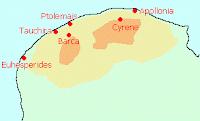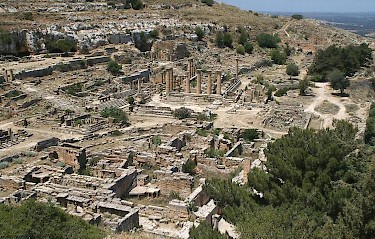Herodotus, bk 4, logos 12
Herodotus of Halicarnassus (c.480-c.429 BCE): Greek researcher, often called the world's first historian. In The Histories, he describes the expansion of the Achaemenid Empire under its kings Cyrus the Great, Cambyses, and Darius I the Great, culminating in Xerxes' expedition to Greece (480 BCE), which met with disaster in the naval engagement at Salamis and the battles at Plataea and Mycale. Herodotus' book also contains ethnographic descriptions of the peoples that the Persians have conquered, fairy tales, gossip, and legends.
Persian conquest of Libya (4.145-205)

This fourth book of Herodotus' Histories ends with a logos about a Persian campaign against the Greek towns in the Cyrenaica. First, Herodotus tells us about the way the Greeks colonized this part of Africa and how they have lived since the adventures of these first settlers.

He interrupts his story to digress on the desert tribes in the Sahara (e.g., the Nasamones), and then returns to his original story. He explains how the Greek settlers are divided and how one of the quarreling factions invites the Persians to take hold of the towns in Cyrenaica. The new masters take many captives, who are deported to far-away Bactria.
Comment
As usual, Herodotus' narrative looks more reliable when he describes the recent past; the legends about the founders of Cyrene are strange, but his description of the Persian invasion seems to be truthful. His description of the tribes in the Sahara belongs to the most convincing parts of his Histories.